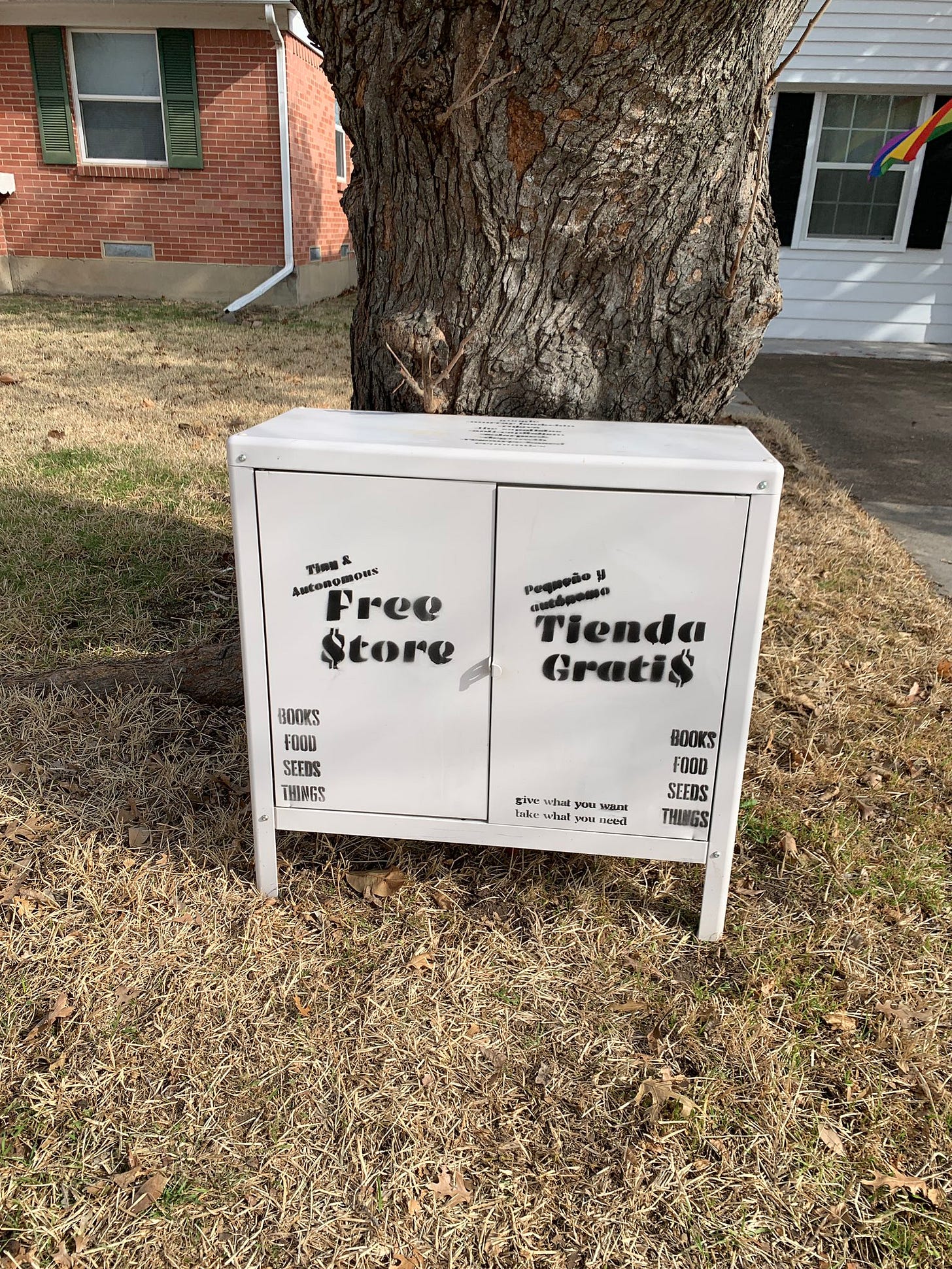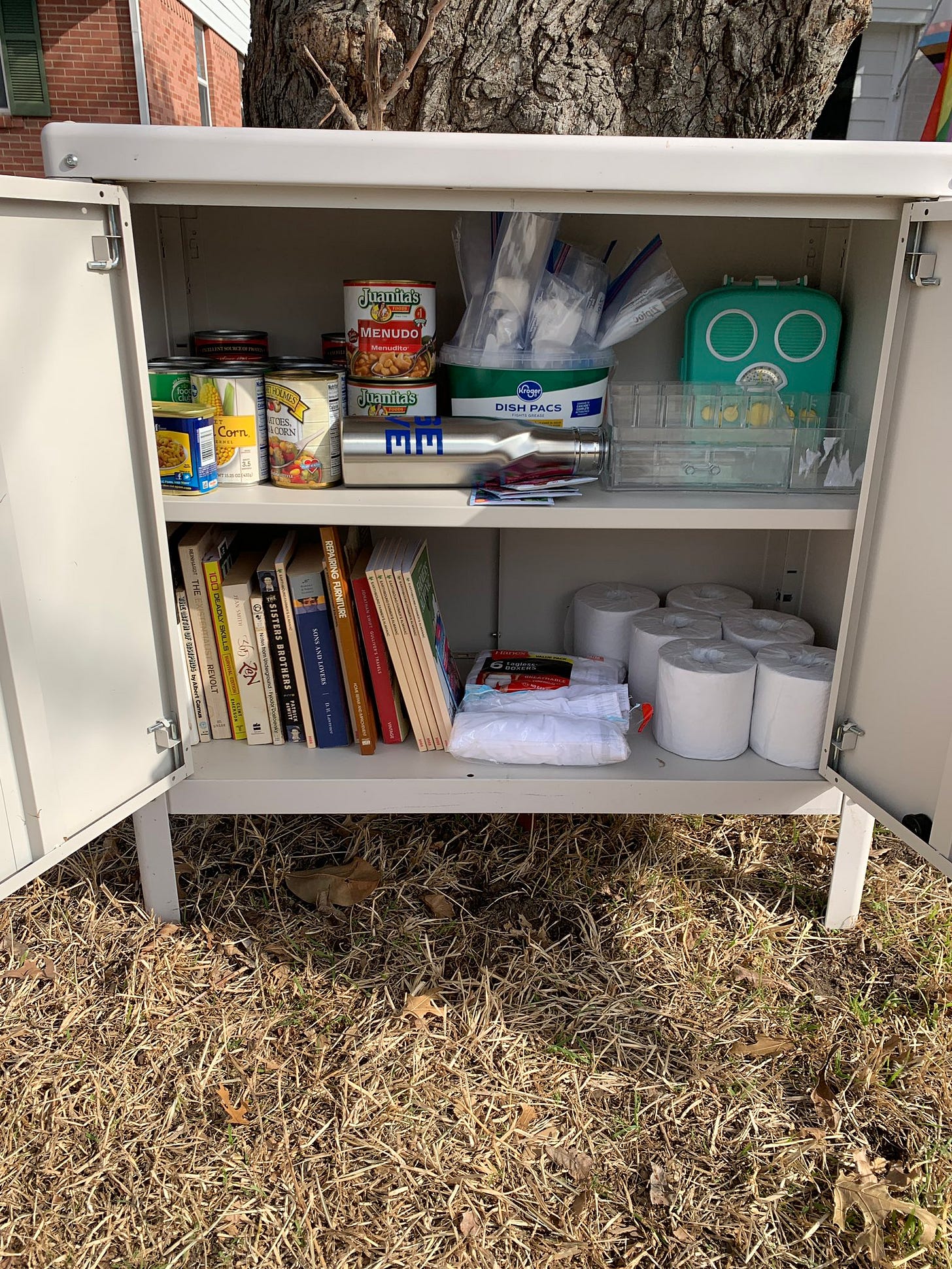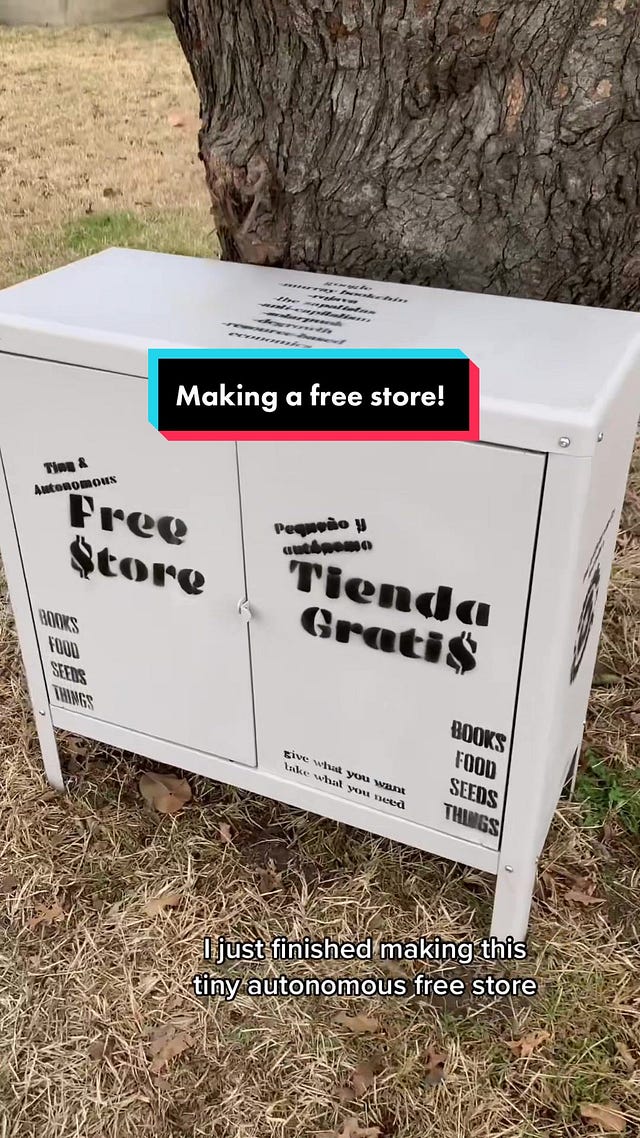Tiny Free Stores & Libraries of Everything: Steps Towards a Post-Capitalist Future
We want to build the world we want to see. How building free stores and open libraries of books, tools, resources, and things can bring us closer to a post-capitalist future.
TL;DR
I made a tiny free store to share resources with my fellow neighbors and give things away for free that otherwise would have ended up in a landfill or thrift store. Adding on I’m going to add QR codes and RFID tags that point to more information like free ebook libraries and info on how to access banned books. The plan is to eventually create an off-grid solar powered server that can locally host that information. Eventually moving into making an automated tool library so people can borrow different tools and have access to them for free.
Overview
Recently I made a tiny free store and put it in my front yard for anyone to take whatever they needed - or leave things they wanted to get rid of but didn’t want either going directly into a landfill or ending up being resold in a thrift store. But why are those the default options for everything we do, to throw it away or sell it? We can’t create unlimited commodities on a finite planet, so why does so much go to waste?
That’s a big question being asked by a ton of people, and the answer might be a radical rethinking of how we produce, use, and discard things. We have everything we need resource-wise on this planet but our access to things is gate kept oftentimes by money or access. So what if we just decided to create non-monetary circular economies? Where people can just have access to the things they need, and when they don’t need something anymore they can pass it on and share it with someone who does - for free. Instead of filling landfills with things that are perfectly good, we can use and reuse things in a smart fashion to meet the needs of all people without things getting in the way of that.
I’ll break this down into two sections, the “how” of making a tiny free store and the “why” or the theory and thought process that goes behind circular/library economies.
Building a tiny free store
Doing this is super simple you need a couple of things to get started:
A container or vessel to house all your stuff
Stuff to add to your container
A nice sunny day to put it out or commandeer an abandoned location (sunny day not required)
The first thing you will need is a container to house all of your free things! This can literally be anything, in my case I saw that someone was throwing away this small cabinet originally from Ikea. More than likely this perfectly good cabinet (with only a tiny broken metal piece on the inside) would have ended up rusting in a metal scrapyard. But you don’t need to wait for your neighbors to throw away highly specific Ikea furniture to do this, really all you need is a semi water resistant case of any kind.
Old newspaper boxes make incredible tiny stores, these are actually quite tiny on the inside and you can use old and abandoned ones or buy a whole lot from people selling like 50 of them for a pretty reasonable price.
Next, you will need to add some supplies. I have a ton of books that I finished but ended up collecting dust on my shelf. Had an entire bin of dishwasher detergent packs sitting in my closet, along with an organizer and a cute radio that we were going to donate to a thrift store. I had a ton of canned food that was all still good to eat but was a little too much to be holding on to. Digging in my seed collection I found some flower seeds that would work great with my local environment and tossed them in. Also had a box left over from a charity drive of toilet paper, which is super expensive and everyone needs so I added some in there as well.
I used a Cricut cutter (I know boo they use DRM and lock their stuff down way too much) to cut out stencils that I used to spray paint directly on the cabinet.
Below is a TikTok going over all of the details!
Upgrades and adding more information
Eventually, I am going to add some QR codes, labels, and RFID tags that point to extra information. Some of these links will be educational material and other things to get people linked up to local mutual aid efforts in the area. Another big part of a free store / free library is providing books, and I want to add a link/QR/RFID link to a giant repository of books I’ve been collecting.
I want to also make a local intranet that hosts this information by running a solar powered off-grid server and intranet network. This is a similar idea to what I talk about in my article about building off-grid community owned networks.
It would also be really cool to eventually create a local community network that will host local services like a free ebook library server that anyone can have access to, media servers to host content, and things like educational services and governance platforms to help facilitate direct democracies in local communities. So the ideas of free and open access to information and the things we need carry over from the digital world over into the physical as well.
The “why” behind all of this: Prefiguration, Social Change, and Libraries of Everything.
We can see the cataclysm of the world around us as we feel the daily effects of climate change, as social systems fall apart, as income inequality gets worse, and as the global south is pillaged for resources to create useless commodities as the world burns. We have to ask why this is all happening, there are plenty of people who will give easy answers to what is going on. Easy to say scapegoats of people to blame. The issues are systematic, what is the systematic issue that is causing/ at the root of/ or central to some of the most pressing issues in our time? Capitalism. The system of capitalism can be found to be at the root or core of most of the major issues around us. With capitalism comes money and market-based systems.
With profit being the central driver behind market economics - things like environmental and social impact are ignored. The goal is to create as many commodities as possible for a little cost as possible and sell them for the highest price to maximize profit. The waste involved is ignored and is encouraged with practices like planned obsolescence. Where commodities are constantly being produced that are designed to break down in order to force people to buy more. What happens to these broken devices? They end up in a landfill at best, at worst they end up floating in a body of water leeching chemicals into the local ecosystem.
There are ideas and systems that can counteract these things, ideas and methods that say “let’s instead focus on what is the biggest benefit to social and ecological good”. Resource-based economics says that economics should be about meeting people’s needs, in the most environmentally sustainable way possible. Not about abstract profits and hoarding money. It’s about seeing what people need and addressing those needs without destroying our planet. Humans have lived on this planet for thousands of years, under an array of different social relations and ways of living. Capitalist, profit based economics that says we should profit while destroying ourselves and the planet is not the only option.
Prefiguration: Building the future we want to see
The future could look like a world without money and capitalist systems. One where we can produce things in line with our ecological impacts on the world while also not overproducing. One where people can have access to an irreducible minimum, free and open access to food, water, homes, communications, and the ability to live a good life. This can happen by shifting to a circular & resourced-based economy, being fulfilled by a library of everything approach.
In our current system, if you need a lawnmower to keep your backyard clean, you need to go and buy a lawn mower. Or you need to pay to rent a lawn mower from a company that will let you use it for a certain amount of time. This means that in your local neighborhood, almost every house has their own lawnmower. OK fine, but that is such a giant waste of resources, the metals that went into producing all of these lawnmowers, the man hours, the parts being shipped halfway around the world. All of that so multiple people can have their own lawnmower that sits in a garage or shed 90% of the month. What if instead, they had open and free access to a library of everything?
Tool libraries are great examples of this, so instead of every single person on a block spending hundreds of dollars on a lawnmower, what if they could signup for their local tool library, check it out for free, use it, and return it?
All of this could be based on a principle of usufruct, you have the ability to borrow things but not to destroy them, these things are held in the commons so all people can use and enjoy them. Sure things will mess up or break down, but they can be fixed! Everything held in a community commons where everyone has access to what they need, at no monetary cost.
There is a great podcast episode about all of this from the folks at Srsly Wrong. This podcast episode goes into complete depth about everything I’m talking about here.
https://srslywrong.com/podcast/189-library-socialism-usufruct/
There are also some amazing videos that go into depth about the topic:








this is brilliant. well done 👏🏾